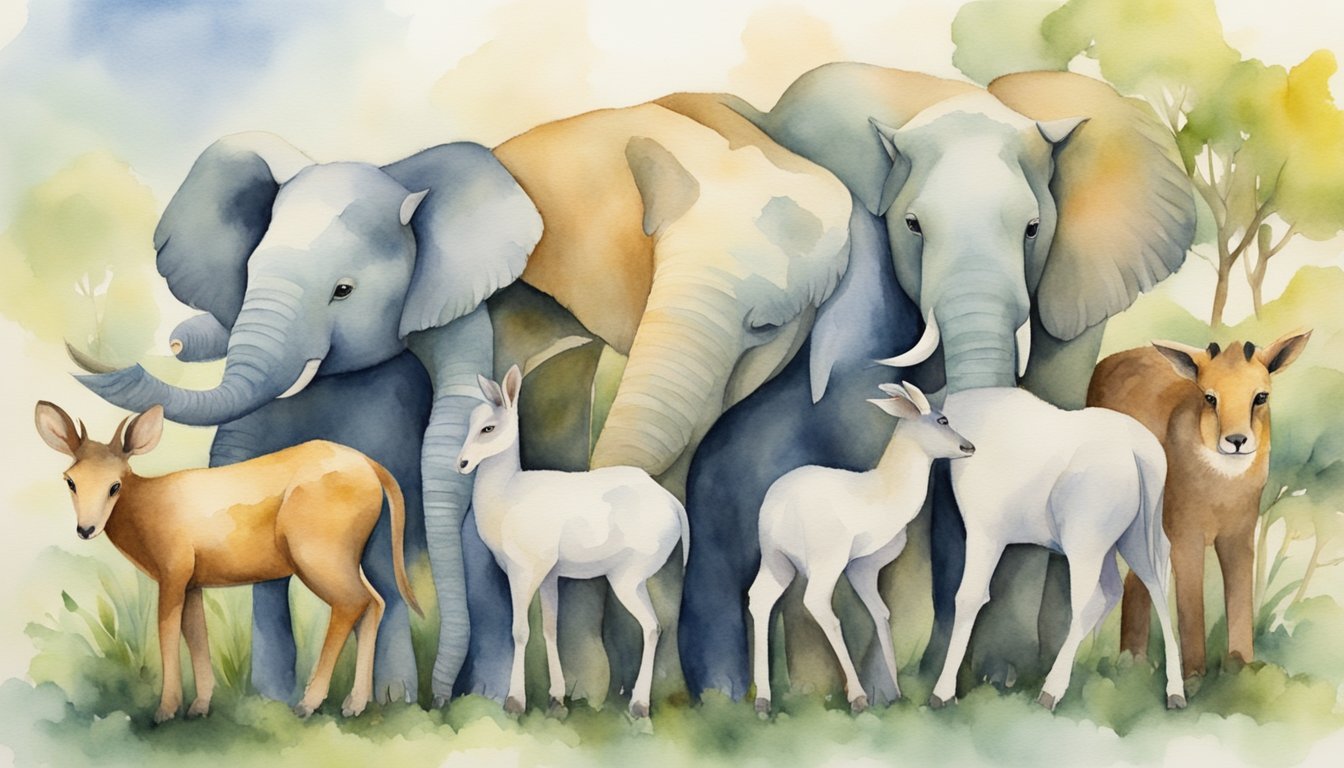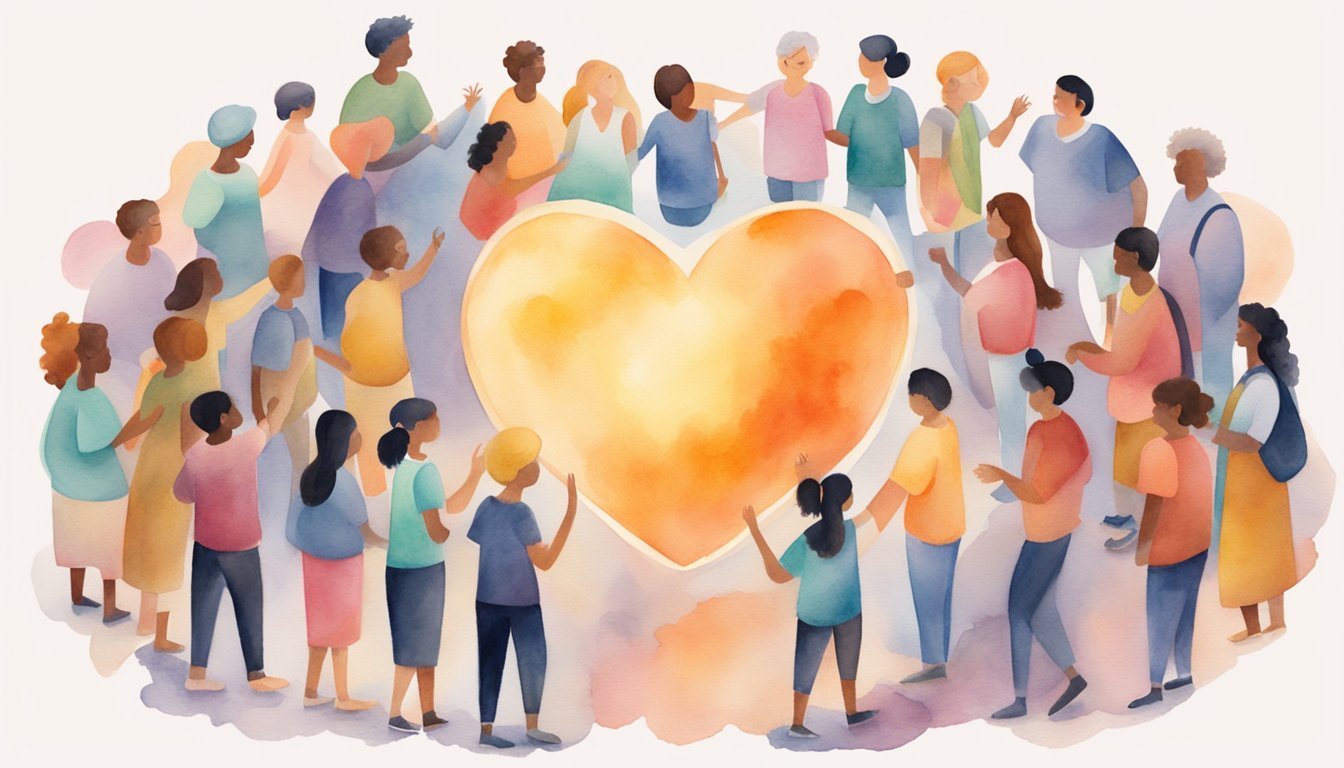19 Altruism Quotes to Inspire Selflessness: Fostering Compassion in Daily Life

Altruism, the selfless concern for others’ well-being, has the power to transform lives and communities.
By putting the needs of others before our own, we can create a ripple effect of kindness that extends far beyond our immediate circle. Inspirational quotes about altruism can remind you of the importance of compassion and encourage you to make a positive impact on the world around you.

In this collection of altruism quotes, you’ll find wisdom from various thought leaders, philosophers, and humanitarians.
These words of wisdom can serve as a catalyst for personal growth and inspire you to embrace a more giving mindset.
Whether you’re looking to cultivate more empathy in your daily life or seeking motivation to engage in acts of service, these quotes offer valuable insights into the transformative power of selflessness.
1) “The best way to find yourself is to lose yourself in the service of others.” – Mahatma Gandhi

This famous quote by Mahatma Gandhi highlights the transformative power of selfless service.
By focusing on helping others, you can discover your true purpose and identity.
When you dedicate yourself to serving others, you gain perspective and find meaning beyond your own needs and desires.
2) “No one has ever become poor by giving.” – Anne Frank

This powerful quote from Anne Frank encapsulates the essence of altruism.
It reminds you that generosity doesn’t diminish your wealth or happiness.
By giving, you enrich your life and the lives of others.
Your acts of kindness create a positive impact that extends far beyond material possessions.
3) “The sole meaning of life is to serve humanity.” – Leo Tolstoy

Leo Tolstoy, the renowned Russian author, believed that serving humanity was life’s ultimate purpose.
His words encourage you to look beyond personal desires and focus on helping others.
By embracing this philosophy, you can find deeper fulfillment and contribute to the greater good.
Consider how you might apply Tolstoy’s wisdom in your daily life to make a positive impact on those around you.
4) “We make a living by what we get. We make a life by what we give.” – Winston Churchill
This powerful quote emphasizes the importance of giving in your life.
While earning money is necessary, true fulfillment comes from what you contribute to others and society.
Consider how you can incorporate more giving into your daily life.
Small acts of kindness and generosity can make a big difference.
5) “The best way to not feel hopeless is to get up and do something.” – Barack Obama
This quote from Barack Obama encourages action as a remedy for hopelessness.
When you feel down, taking steps to improve your situation can be empowering.
By focusing on what you can control and making positive changes, you create momentum.
This proactive approach can help you overcome feelings of helplessness and despair.
6) “Only a life lived for others is a life worthwhile.” – Albert Einstein
Albert Einstein’s quote highlights the value of selflessness.
It suggests that true fulfillment comes from helping others.
You can find meaning by focusing on others’ needs. Living for others can bring lasting satisfaction and purpose to your life.
7) “Happiness is not something ready made. It comes from your own actions.” – Dalai Lama
This quote from the Dalai Lama emphasizes that happiness is not a pre-packaged gift.
You create your own happiness through your choices and behaviors.
Your actions shape your experiences and emotions.
By focusing on positive, altruistic deeds, you can cultivate more joy in your life.
8) “It’s not how much we give, but how much love we put into giving.” – Mother Teresa
Mother Teresa’s words remind you that genuine giving transcends monetary value.
The impact of your generosity lies in the sincerity and compassion behind your actions.
Your kindness shines through in small gestures filled with love.
Even a simple act can make a difference when done with heartfelt care.
9) “Service to others is the rent you pay for your room here on Earth.” – Muhammad Ali
This powerful quote from boxing legend Muhammad Ali emphasizes the importance of giving back to society.
It suggests that you have a responsibility to contribute positively to the world around you.
By serving others, you fulfill your duty as a member of the human community.
10) “Love and kindness are never wasted.” – Barbara De Angelis
This quote reminds you that acts of love and kindness always have value.
Your compassionate actions make a positive impact, even if you don’t see immediate results.
Love and kindness bless both the giver and receiver.
By extending kindness, you create ripples of positivity that spread outward.
11) “Life’s most persistent and urgent question is, ‘What are you doing for others?'” – Martin Luther King Jr.
This powerful quote challenges you to consider your impact on others.
It emphasizes the importance of selfless action in your daily life.
Consider how you can contribute positively to your community and those around you.
12) “The greatest gift you can give someone is your time.” – Rick Warren
Rick Warren emphasizes the value of time as a precious resource.
When you give your time to someone, you’re offering a part of your life that can’t be replaced.
Your time is limited, making it the most valuable gift you can share with others.
13) “Helping one person might not change the whole world, but it could change the world for one person.” – Unknown
This quote emphasizes the power of individual acts of kindness.
While you may not transform the entire world, your actions can profoundly impact someone’s life.
Consider how a small gesture of help could change the world for one person.
Your kindness might be exactly what someone needs to overcome a challenge or find hope.
14) “You have not lived today until you have done something for someone who can never repay you.” – John Bunyan
This powerful quote encourages you to perform selfless acts daily.
It suggests that true fulfillment comes from helping others without expecting anything in return.
By assisting those who cannot reciprocate, you cultivate genuine altruism and compassion.
15) “The meaning of life is to find your gift. The purpose of life is to give it away.” – Pablo Picasso
This quote attributed to Pablo Picasso encapsulates a profound view on life’s purpose.
It suggests that you have a unique talent or ability to discover.
Once you uncover your gift, your purpose becomes sharing it with others.
16) “If you want others to be happy, practice compassion. If you want to be happy, practice compassion.” – Dalai Lama
This quote from the Dalai Lama emphasizes the importance of compassion in achieving happiness.
By practicing compassion, you can bring joy to others and yourself.
Compassion involves understanding and empathizing with others’ feelings.
When you show kindness and care, you create positive connections and improve wellbeing for everyone involved.
17) “What we have done for ourselves alone dies with us; what we have done for others and the world remains and is immortal.” – Albert Pike
This powerful quote by Albert Pike emphasizes the lasting impact of altruism.
It suggests that your selfless actions create a legacy that endures beyond your lifetime.
Pike’s words encourage you to focus on helping others and contributing to the world around you.
By doing so, you can leave a meaningful and immortal mark on society.
18) “Be the change you wish to see in the world.” – Mahatma Gandhi
This powerful quote encourages you to take personal responsibility for creating positive change.
Instead of waiting for others to act, you can embody the qualities and behaviors you want to see more of in society.
By aligning your actions with your ideals, you set an example for others to follow.
Your individual efforts can inspire wider change and make a meaningful difference in the world around you.
19) “The purpose of life is not to be happy. It is to be useful, to be honorable, to be compassionate, to have it make some difference that you have lived and lived well.” – Ralph Waldo Emerson
This famous quote challenges you to reconsider your life’s purpose.
Instead of pursuing happiness, Emerson suggests focusing on being useful and making a positive impact.
You can find fulfillment by living honorably and compassionately.
Your actions can create meaningful change in the world around you.
Understanding Altruism
Altruism is a fundamental aspect of human behavior that promotes selflessness and compassion.
It encompasses the concept of putting others’ needs before your own and has been studied extensively in various fields, including psychology, philosophy, and sociology.
Definition of Altruism
Altruism refers to selfless acts of helping others without expecting anything in return.
It’s a behavior that prioritizes the well-being of others over personal gain.
You demonstrate altruism when you volunteer at a local shelter, donate to charity, or help a stranger in need.
Altruistic actions can range from small, everyday kindnesses to significant sacrifices.
Examples include:
- Donating blood
- Mentoring a young student
- Giving up your seat on public transport
- Volunteering for community service
Historical Perspectives on Altruism
Throughout history, altruism has been a central theme in many philosophical and religious teachings.
Ancient Greek philosophers like Aristotle discussed the concept of selflessness as a virtue.
In Eastern philosophies, altruism is often linked to concepts of compassion and interconnectedness.
The term “altruism” was coined in the 19th century by Auguste Comte, a French philosopher.
He used it to describe selfless behavior that benefits others.
Since then, the concept has been explored in various fields:
- Evolutionary biology: Studying altruism in animal behavior
- Sociology: Examining altruism’s role in social cohesion
- Psychology: Investigating motivations behind altruistic acts
Psychological Benefits of Altruism
Engaging in altruistic behavior can have significant positive effects on your mental well-being. Practicing altruism can reduce stress and increase overall happiness.
When you help others, your brain releases endorphins, creating a sense of satisfaction and joy.
Key psychological benefits of altruism include:
- Improved self-esteem
- Reduced feelings of isolation
- Enhanced sense of purpose
Altruistic acts can also foster stronger social connections, leading to a more supportive community.
By engaging in selfless behavior, you not only help others but also contribute to your own emotional growth and well-being.
Altruism in Practice
Altruism manifests in various ways across daily life, cultural contexts, and personal motivations.
Understanding its practical applications can inspire more selfless actions and create positive change in communities worldwide.
Everyday Acts of Altruism
You can practice altruism through simple, everyday actions.
Volunteering at local charities or community centers is an excellent way to give back.
Donating blood, clothes, or food to those in need also makes a significant impact.
Random acts of kindness, like helping a stranger carry groceries or paying for someone’s coffee, spread positivity.
Offering emotional support to friends and family during tough times is another form of altruism.
Consider mentoring someone in your field of expertise or tutoring students who need academic assistance.
These actions not only help others but also foster personal growth and satisfaction.
Altruism in Different Cultures
Altruism takes various forms across cultures, reflecting diverse values and traditions.
In some Asian cultures, the concept of “filial piety” emphasizes caring for elderly parents as a moral duty.
Many African cultures prioritize community well-being over individual gain, exemplified by the Ubuntu philosophy.
This belief system promotes compassion and mutual support among community members.
In Western societies, philanthropy often involves financial donations to causes or organizations.
However, grassroots movements and community service are also prevalent forms of altruism.
Religious practices worldwide often incorporate altruistic acts, such as almsgiving in Islam or the concept of seva (selfless service) in Sikhism.
Altruism vs. Self-interest
The relationship between altruism and self-interest is complex.
While pure altruism involves helping others without expectation of reward, some argue that all actions have an element of self-interest.
You may experience personal benefits from altruistic acts, such as improved mood, increased life satisfaction, and enhanced social connections.
These positive outcomes can motivate further altruistic behavior.
In some cases, altruism and self-interest align.
For example, volunteering can boost your resume while helping a cause.
Corporate social responsibility initiatives can benefit both communities and company reputations.
It’s important to recognize that altruism doesn’t require complete self-sacrifice.
Balancing personal needs with helping others can lead to sustainable, long-term altruistic practices.

